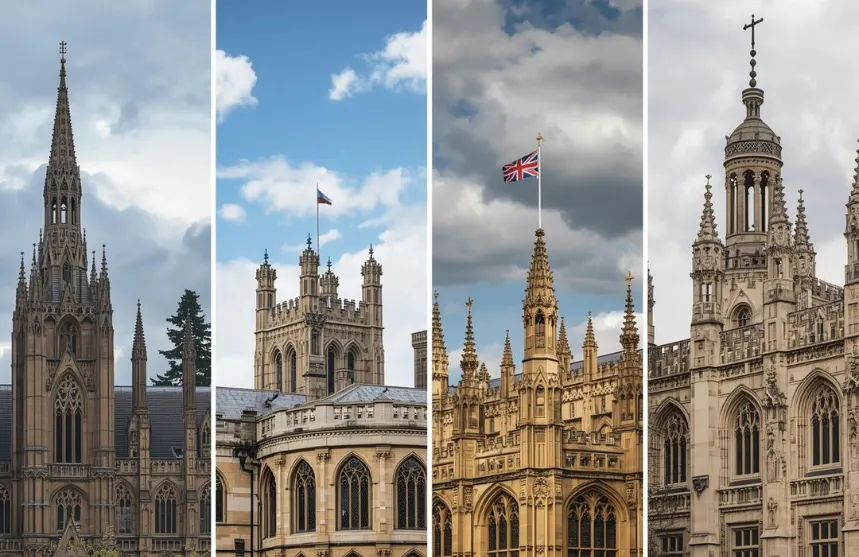Hotel Management Courses Abroad: Top Countries, Career Pathways & The Ultimate Guide
Student’s Guide to Study in New Zealand in 2025

New Zealand also called the ‘the Land of the Long White Cloud’ is fairly emerging on the map as the preferred study abroad destination. Famous for its stunning geographical features, rich culture and quality education it is not surprising that New Zealand has countless students flocking into the country every year.
For students coming from India, it’s also a chance to get a qualitative education and embrace the multicultural experience created by New Zealand. This guide provides you with an overview to study in New Zealand including admissions, universities, scholarships, visas, living costs and many other important aspects. Whether you are planning for your education in New Zealand, this is the best guide for anyone planning to study in another country that has all the information to help him or her make the right decision.
Study in New Zealand Highlights
Students are advised to check out the necessary information related to studying in New Zealand before applying to study abroad:
| Information | Details |
|---|---|
| Total Universities | 9 |
| Average Acceptance Rates | Between 45% to 65% |
| English Exams to Study Abroad | IELTS / PTE / TOEFL |
| Financial Aid | Scholarships |
| Average Scholarship in NZ for International Students | NZD 9,000 |
| Permitted Part-Time Working Hours | 20 hours per week |
Why Study in New Zealand?
There are many advantages when a student decides to get their higher education in New Zealand. Here are some of the key reasons why you should consider studying in New Zealand:
Globally Recognised Education System: New Zealand’s facility in providing education for learners has received numerous commendations internationally. The country boasts effective universities, state-of-the-art laboratories, and excellent programs. A qualification from a university in New Zealand is well appreciated and valued in other countries.
Innovation and Research Opportunities: New Zealand universities focus on a lot of research and on providing students with opportunities to engage with practices and projects. Whatever course you are undertaking be it IT, business, or arts the experience is priceless.
Work Opportunities During and After Study: Foreign students in New Zealand can take part-time jobs up to 20 hours a week during the semester and full-time during the holidays. The students, once they complete their education, can use the work permission visa to find employment and work experience in the country. This is particularly helpful to those who wish to begin their working careers in New Zealand.
Affordability: The good news is that tuition fees to study in New Zealand for Indian students are usually more affordable compared to other countries such as the USA, the United Kingdom or Australia. The general cost of learning is relatively favourable, and the costs of living are also affordable, especially outside of Auckland.
Safe and Welcoming Environment: It is famous for its safety for residents of the country and foreigners, as well as low rates of criminality and high levels of tolerance for different people. Foreign students are well received hence the process of getting accustomed to the new environment is easily facilitated.
Work-Life Balance: New Zealand has a beautiful landscape as well as a friendly culture that makes it easy for students to have some fun and at the same time get to achieve their studies.
New Zealand Education System
New Zealand has a systematic education system, you need to understand the education system before applying to study there. The education system is divided into three main levels:
Primary and Secondary Education: Education in New Zealand starts at the age where the child is 5 years old and lasts up to the final year of high school. New Zealand’s primary and secondary schools are characterised by high quality and subject offerings that entail multiple diverse and preferred subjects.
Tertiary Education: The Education System of New Zealand – Tertiary Education consists of universities, polytechnic and private tertiary institutions. New Zealand has Universities that provide undergraduate and postgraduate education in arts, business, technology and sciences.
Vocational Education and Training (VET): For students who have the desire to learn skills that will be immediately applicable on the job, VET serves as the best option. That aside, other programs are certificates, and diplomas in hospitality, trades, and health training that offer practical learning.
Top Universities to Study in New Zealand
Check out the list of top universities to study in New Zealand mentioned below:
- Ara Institute of Canterbury
- Auckland Institute of Studies
- Nelson Marlborough
- Pacific International Hotel Management
- Southern Institute of Technology
- Toi Ohomai Institute of Technology
- Unitec Institute of Technology
- University of Canterbury
- Victoria University of Wellington
New Zealand Admission Requirements 2024-25
The New Zealand admissions differ for each of the study programs and levels. For each course, Indian students will be required to achieve a minimum determined level in English. In addition to that, candidates must have scored at least 75% and above in the standard XII examination. The Foundations and Diploma programmes are offered to candidates who have obtained not less than 75% on average. Any student joining a degree programme should have accomplished 18 years.
The following documents also need to be submitted:
- If you have had work experience then two letters of recommendation from the employer/manager who knows you and can testify on your strengths at work.
- Statement of Purpose
- Resume
- With photocopy of the original score reports of GMAT / IELTS / TOEFL
- Portfolio (where required when applying for students that intend to apply for art and design courses & architecture Programmes)
- Others (Certificates/achievements at the state and national level and extracurricular activities)
How to Apply to Study in New Zealand?
Here in New Zealand, admission to universities is very easy. Here’s how you can apply:
- When choosing which university to attend, look for the university and courses that are appropriate for you or which university offers the course you wish to pursue.
- Studying the admission requirements of the chosen program it is necessary to pay attention to the required academic achievements and tests in English.
- Some of the documents which the student should present include; their previous academic records, English proficiency tests, and any other documents as per the University standards.
- Directly submitted to the university of their choice through an online application.
- Indeed, there are some universities that allow applications to be made through an agent.
- Applicants will receive an offer letter after applying which entails eligibility to attend the application process.
- You can then go ahead and book for visas and lodging.
Study in New Zealand Intakes
New Zealand offers two primary intakes for international students:
Semester 1 (February-March): The first intake is for students who intend to join the undergraduate and postgraduate programs that commence in February or March.
Semester 2 (July): The second one is for those students who want to start their studies in July usually for the programs which have flexible intakes.
New Zealand Admission Language Exams
There are certain exams to study abroad which students must choose, if they wish to study abroad. The most commonly accepted exams are:
IELTS (International English Language Testing System): It is used mostly for international students, but is one of the most accepted tests out there. This depends on the program but usually is between 6.0 and 7.0 Many universities set out the minimum result depending on certain courses but it is mostly between 6.0 and 7.0.
TOEFL (Test of English as a Foreign Language): Another widely accepted test. Possible scores are usually ranging from 80 to 100 with different variations according to the program that is taken.
PTE (Pearson Test of English): An English test that can be taken on a computer and acknowledged by most universities.
Cost of Living in New Zealand
All in all, you should expect to spend approximately NZD 12,000 – 15,000 per year for your living expenses. This is over and above tuition fees. The cost of living in New Zealand varies depending on the city you live in, but here’s a rough estimate of what you can expect:
Accommodation: It costs NZD 200 – 500 per week to rent a house or apartment (depending on the city and type of the facility, Auckland is rather expensive).
Food: NZD 80 – 150 weekly depending on your food consumption.
Transportation: NZD 10 – 25 per week (Although public transportation is highly affordable in most cities, it is also very reliable).
Utilities: An average of NZD 50 – 100 a month is needed for electricity, water, and internet bills.
How Expensive is Studying in New Zealand?
Studying in New Zealand costs varies according to the chosen university and course. On average, cost of studying in New Zealand for indian students range as follows:
Undergraduate Programs: NZD 22,000 – 32,000 per year.
Postgraduate Programs: NZD 26,000 – 37,000 per year.
Study in New Zealand Exam Fees
Students are advised to check out the exam fees to study in New Zealand:
| Exams | Exam Fees |
|---|---|
| IELTS | 16250 INR |
| TOEFL | 16900 INR |
| PTE | 15900 INR |
| GMAT | 22800 INR |
| GRE | 22500 INR |
Scholarships in New Zealand
Scholarships in New Zealand are of two types, the merit fee waivers for students, and the need fee waivers for students. Students with good performance in their earlier classes, aptitude tests and end-term examinations, and extracurricular activities would be entitled to a scholarship scheme and heads of assistance.
Documents Required:
Below are the documents mostly required while applying for a scholarship even though the documents vary depending on each:
- University documents as well as photocopying.
- A recent CV
- A letter of intent serves as the cover page of the document.
- Academic document: certificate of language proficiency if the applicant is an international student, TOEFL /IELTS score.
- Letters of Reference (LOR)
Study in New Zealand Education Loan Requirements
The first thing to do is to know whether or not it is applicable to apply for the loan. The general eligibility criteria that are followed by all the banks are:
- You should be an Indian national
- You need to have a good academic background
- You should be applying for a professional, technical or another type of course and program. Almost all the banks interviewed supported the view that the selected course should be job-oriented.
- You must have obtained admission to a foreign university institution
- You must be over 18 years of age as the parents can avail of such a loan.
Study in New Zealand Education Loan Eligibility Criteria
You may not get a loan on every course and this is why it is important to earn a scholarship on a particular course. The following are the categories of courses with regard to the education loan.
For Graduation: Parallel courses leading to Professional or Technical degrees from recognised universities
For Post Graduation: MCA, MBA, MS or even diplomas
These courses could be from a university or any other foreign institute recognised by the state and central government.
Student Visa in New Zealand
To study at a university or college in New Zealand you must have a student visa if you are a foreigner. Students are required to carry the following documents for New Zealand student visa application purposes:
- At least your passport has to remain valid for a minimum of three months after your stay in New Zealand.
- Submitted International Student formulated Application for a Visa (ISAAV)
- Receipt of the payment of the application fee As you have been informed earlier you will be required to pay Rs 5,194 or 100 NZD before your interview
- Only available to students – You must have an offer of place from an institute/university in New Zealand. The forms are often given after the tuition fees have been paid.
- Letter of status in the current institution as a study abroad student
- Health insurance receipt
- You may be requested to present Health and Character certificates as evidence of the fact that it is your intention to stay in New Zealand.
- Two identical photographs of the applicant not less than 2 inches x 2 inches in size.
New Zealand Work Permit
You can work part-time for up to 20 hours per week if your programme of study meets one of these criteria:
- It takes minimally two years to complete
- It results in New Zealand qualification which makes an applicant eligible for points for Skilled Migrant visa.
- It is a tertiary institution and the primary function is to enhance English proficiency – you should also present overall IELTS of not less than 5.0 in the academic or the general modules.
- If your full time programme of study is at least eight months long and is divided into two semesters you can work full time during Christmas and new year vacation if your programme of study has less credits than one hundred twenty.
Conclusion
New Zealand provides international students with quality education at a low cost, affordable living standards and a friendly environment. These factors combined with New Zealand’s talented universities, sound academic courses, and equal job and career chance avenues let study abroad in New Zealand lay the foundation for a successful future.
If you’re prepared for the adventure of a lifetime – New Zealand has everything you would need to achieve your academic potential while being able to enjoy one of the most beautiful and varied countries in the world. Please regard this student guide as your first trip toward a great educational journey!
Frequently Asked Questions
Yes, indeed New Zealand has all that an international student looks for such as good universities, a colourful culture and an improved standard of living.
Tuition fee for studying in New Zealand also differs, students could between NZD 22000 and 32000 per year for tuition fees alone, not including living expenses.
Of course, you can apply to study in New Zealand if you are a student from India, and lots of universities offer a variety of scholarships for you.


















































